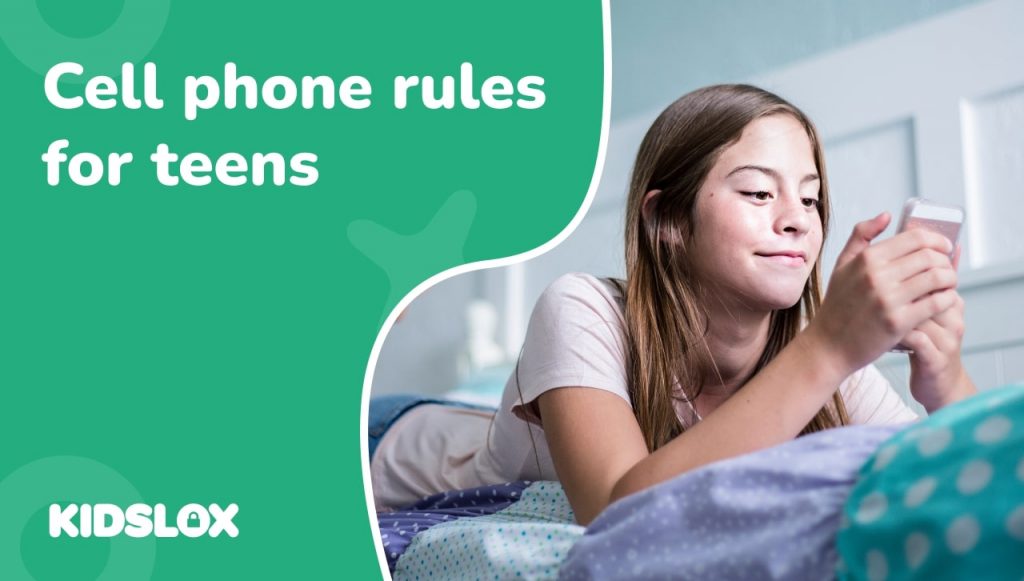How to help your 12-14 year old manage their cell phone responsibly
These days, the majority of young teens own a cell phone. By the age of 15, it’s estimated that 88% of teens have a device. You may be wondering how best to introduce a cell phone to your younger teen, or trying to enforce some more structure to help restore harmony and balance in the family. Throughout this Guide To, we will explore the essential rules to understand and put in place for your 13-14 year old and their cell phone.
What should you consider before buying your teen a cell phone?
The early teens are a time of complex psychological and physical changes. While children at this age start to develop their capacity for more complex thoughts and emotions, they’re also susceptible to peer pressure and can still be immature in many ways.
It’s difficult to generalize as some young teens will struggle more than others during these pivotal years, but parents should be aware of the following:
Increased independence
At the age of 13, kids are often beginning to seek more independence from their parents or caregivers, which means they’re more likely to want to spend more time with friends over family, want to make decisions about their appearance or the hobbies they’re enjoying, and start to push back against rules and expectations.
Mood swings
During puberty, hormonal changes can cause your teenager to experience mood swings and emotional ups and downs. Little things can become huge problems and they’re often a lot more self conscious. They may feel irritable, anxious, or overwhelmed at times, but this is normal and usually passes with time.
Desire for social connection
At the age of 13 and 14, teens are very focused on their peer relationships and may be very interested in fitting in with their peers. They may be more likely to engage in group activities and social media, which can lead them to spending too much time on their cell phone than what’s healthy.
Interest in romantic relationships
Many 13-year-olds start to develop an interest in romantic relationships, although this can vary widely from person to person. They may start to have crushes or be curious about dating. Again, a cell phone allows your teen to message others, often without your knowledge.
Getting personal
13-year-olds are often trying to figure out who they are as individuals and may experiment with different styles, hobbies, and interests to find what feels right for them. A cell phone can help them to research, find friends who share similar interests and learn more.
All of these elements have a huge impact on the way your child will interact with their cell phone, and will inform their behavior. Here’s how to create a plan that will help support your 13-14 year old in maintaining a healthy relationship with their cell phone.
How to manage limits and boundaries with your 13 or 14-year old and their cell phone
Given half the chance most teens will spend hours on their devices, so limits are really important. Before your child can play on their phone they must address their priorities, including homework, chores and time with family. At the age of 13 and 14, young teens are particularly impressionable. The hormonal, social and normal developmental milestones teens experience means that parents should pay extra attention to the relationship their child has with their cell phone.
Transparency and collaboration are key
Teenagers are no strangers to rebellion so heavy handed tactics to enforce cell phone rules can cause serious disruption at home. Instead, find an opportunity to talk to your child about cell phone safety. Start by asking them what they already know and build from there. Once you have built a rapport, let them know that their safety is always your priority and you want to be involved in this part of their life for positive reasons.
Build the rules together
One of the most important elements of the cell phone rules you want to create with your 13 or 14-year-old teen is going to be the times they can use the device, and for how long. Start by asking them what’s important to them, and what times they think would work the best for them to focus on school work and other priorities.
Have no-cell zones and times for everyone in the family
Teens are smart, and they’ll soon notice if you’re being a hypocrite with your own cell phone behavior. Use this opportunity to enforce some really healthy new habits for everyone, including no phones at the dinner table and no phones in the bedroom.
Sleep and cell phones rules for teens
It might be one of the toughest rules to enforce, but banning the phone before bed is recommended by many experts and pediatricians. Teenagers need a lot of rest to help their psychological and physical development. A lack of sleep can have serious emotional and health problems for young people, so prioritizing ample rest is very important. Cell phones emit sleep disrupting blue light, not to mention the lure of the notifications throughout the night. Put the phone in another room before bed and invest in an old-fashioned alarm clock instead.
School rules and cell phones
Another crucial area for your 13 or 14-year old is ensuring that they follow cell phone rules set by the school. The school policy may allow having phones on campus, but students should have them turned off and away during classes.
And, it’s not just at school where your teen needs to be respectful. General cell phone etiquette is another point to emphasize. Highlight the importance of keeping the phone in silent mode when in public places like at church, on transport, in restaurants, and at the movies.
Spot checks
In order to deter your teen from abusing their cell phone privileges, let them know that there will be spot checks on the device. You can check the contents of their kid’s cell phone, including contacts, calls, messages, and pictures. Encourage cooperation by explaining why you’re doing the checks. It can also include ensuring their keeping important information safe, and coaching them on how to use their phone effectively.
Digital etiquette and being a responsible digital citizen
One of the most important things to ensure your 13 or 14-year old teen understands is the importance of being kind, responsible and safe online. Cyberbullying, inappropriate content and harmful behavior should all be forbidden.
Online Grooming
Where teens gather, predators follow. Teaching your teen how to recognize grooming behaviors is essential. Your teens should never engage in private conversations with people they don’t know, share personal information or send inappropriate images or videos to others.
Staying secure
To ensure online safety, ensure your teen understands why they should keep their private information secret and secure. Teach them about password hygiene and why it’s important.
Cell phone rules for 13-14-year-old children: putting them into action
Sign a cell phone contract
Once you have decided your rules, make a contract and get your teen to sign it. Put this in a public place in your home as a reminder of the importance of being responsible and be really clear about what will happen if they break the rules.
Use parental controls for extra support
Now you’ve made the rules, you may be wondering how you can ensure that they’re enforced. As a parent you have so many things to think about and it’s easy to let some things slide when there are bigger problems at hand. By using parental controls you have added support to ensure that your kids are safe and aren’t spending too much time online. Kidslox has a variety of features that makes it perfect for enforcing cell phone rules for 13-14 year olds, including timing out apps that your teen finds hard to put down and blocking inappropriate apps, websites and those unexpected purchases. You can also track your teens location and request to see their screen on demand. Parental controls also serve as a constant reminder to your teen that the rules are there, and there for a reason – their safety and wellbeing! Try for free today.





